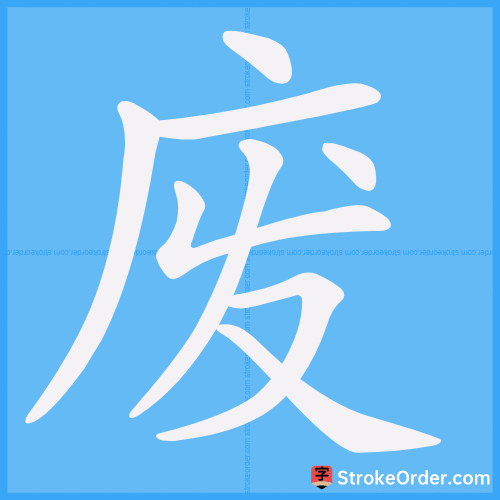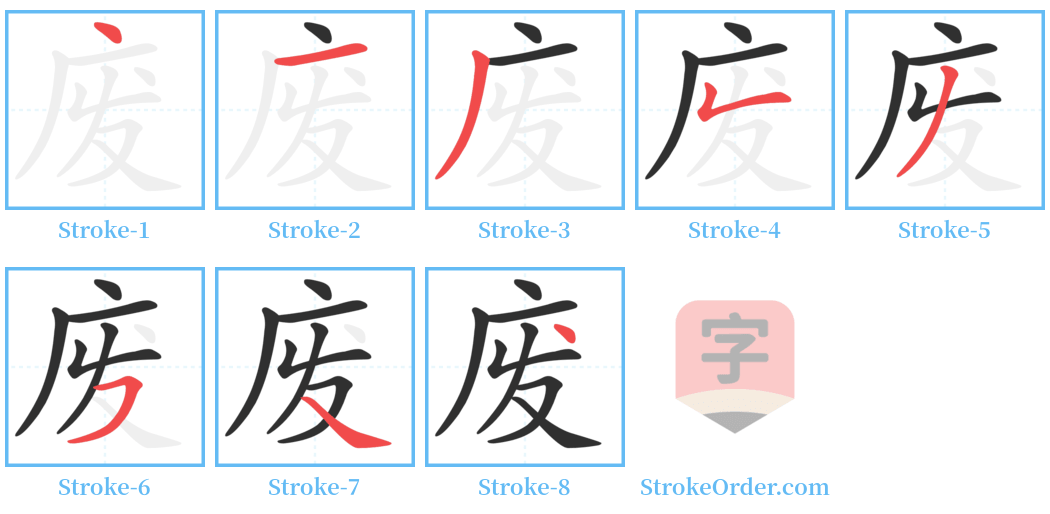废 Stroke Order
Animated Stroke Order of 废

Stroke Order Diagrams for 废

Step-by-Step Handwriting Guide for 废

Learn to Write Chinese Characters with Video Tutorials
Watch the video of writing the Chinese character "废", learn the correct stroke order (笔顺) of the character "废", and master the standard way of writing the character "废".
Free Printable Handwriting Practice with Stroke Order: 废
Printable Writing Practice Worksheet of "废" in Portrait Orientation (Tian Zi Ge)

Printable Writing Practice Worksheet of "废" in Landscape Orientation (Tian Zi Ge)

Information of 废
Pinyin
fèi
Radical
广
Strokes
8 strokes
Usage
★★★★★
Definition
abolish / crippled
废 (fèi)
1. 停止,不再使用。
Stop, no longer in use.
2. 没有用的,失去效用的。
Useless, lost effectiveness.
3. 没有用的东西。
Useless things.
4. 荒芜,衰败。
Desolate, degenerating.
5. 重伤或杀死某人。
Seriously injure or kill someone.
6. 停止,不再使用:~弛(应该施行而不施行)。~除。~黜(罢免,革除)。~帝(被废黜的皇帝)。~弃。~止。~置。因噎~食。
Stop and no longer use: abandon (should be implemented but not), eliminate, dismiss, dethroned emperor, discard, stop, dispose. Because of choking... stop eating.
7. 没有用的,失去效用的:~话。~品。~墟(受到破坏之后变成荒芜的地方)。
Useless, lost effectiveness: nonsense, waste products, ruined area (turns desolate after being damaged).
8. 没有用的东西:修旧利~。利用“三~”(“三废”,废气、废水、废渣)。
Useless things: repair the old to benefit the waste; utilize “three wastes” (waste gas, waste water, waste residue).
9. 荒芜,衰败:田园荒~。几经兴~。
Desolate, degenerating: deserted fields; after several rises and falls.
10. 重伤或杀死某人:~了他。
Seriously injure or kill someone: (he was) killed.
11. 功能丧失或被中止。
Function loss or interruption.
lit. not eating for fear of choking (idiom); fig. to cut off one's nose to spite one's face / to avoid sth essential because of a slight risk
turn waste into wealth / change waste material into things of value / recycle waste material / upcycle
to neglect sleep and forget about food (idiom) / to skip one's sleep and meals / to be completely wrapped up in one's work
to abandon (cultivated fields) / no longer cultivated / to lie waste / wasted / to neglect (one's work or study)
Input Method for 废
Pinyin
fei4
Wubi
ynty|onty
Cangjie
iive
Zhengma
tgxs
Four Corner
00247
Unicode
U+5e9f
Same Pronunciation Characters